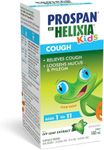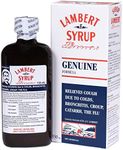Buying Guide for the Best Cough Syrups
Choosing the right cough syrup can make a big difference in how quickly and comfortably you recover from a cough. It's important to understand that not all cough syrups are the same—some are designed to suppress a cough, while others help loosen mucus or address other symptoms. The best choice depends on the type of cough you have and any other symptoms you’re experiencing. Always read the label carefully and consider your own health needs, such as allergies or other medications you may be taking. If you have any doubts, consult a healthcare professional before making a decision.Type of Cough (Dry vs. Wet)Cough syrups are often formulated for either dry (non-productive) or wet (productive) coughs. A dry cough is one where you don’t bring up any mucus, and it can be irritating or tickly. Wet coughs involve mucus or phlegm. Syrups for dry coughs usually contain suppressants to reduce the urge to cough, while those for wet coughs have expectorants to help loosen and clear mucus. To pick the right one, identify whether your cough is dry or wet—this will guide you to the most effective formula.
Active IngredientsThe main ingredients in cough syrups determine how they work. Common suppressants include dextromethorphan, which calms the cough reflex, while expectorants like guaifenesin help thin and loosen mucus. Some syrups also include antihistamines or decongestants for additional symptoms. Understanding what each ingredient does helps you match the syrup to your symptoms. Always check the label for ingredients and avoid combinations that you don’t need.
Alcohol ContentSome cough syrups contain alcohol, which can act as a preservative or solvent. While small amounts are generally safe for adults, alcohol-containing syrups are not suitable for children, pregnant women, or people with certain health conditions. If you want to avoid alcohol, look for syrups labeled as 'alcohol-free.'
Sugar ContentMany cough syrups use sugar to improve taste, but sugar-free options are available for people with diabetes or those who want to avoid extra sugar. If you have dietary restrictions or are concerned about sugar intake, check the label for sugar content and opt for sugar-free versions if needed.
Age AppropriatenessCough syrups are often formulated differently for adults and children. Some ingredients are not safe for young children, so always check the recommended age on the packaging. If you’re buying for a child, choose a syrup specifically labeled for their age group.
Additional Symptom ReliefSome cough syrups also target symptoms like sore throat, congestion, or fever. If you have multiple symptoms, a multi-symptom syrup might be helpful. However, if you only have a cough, a simpler formula may be better to avoid unnecessary medication.



















